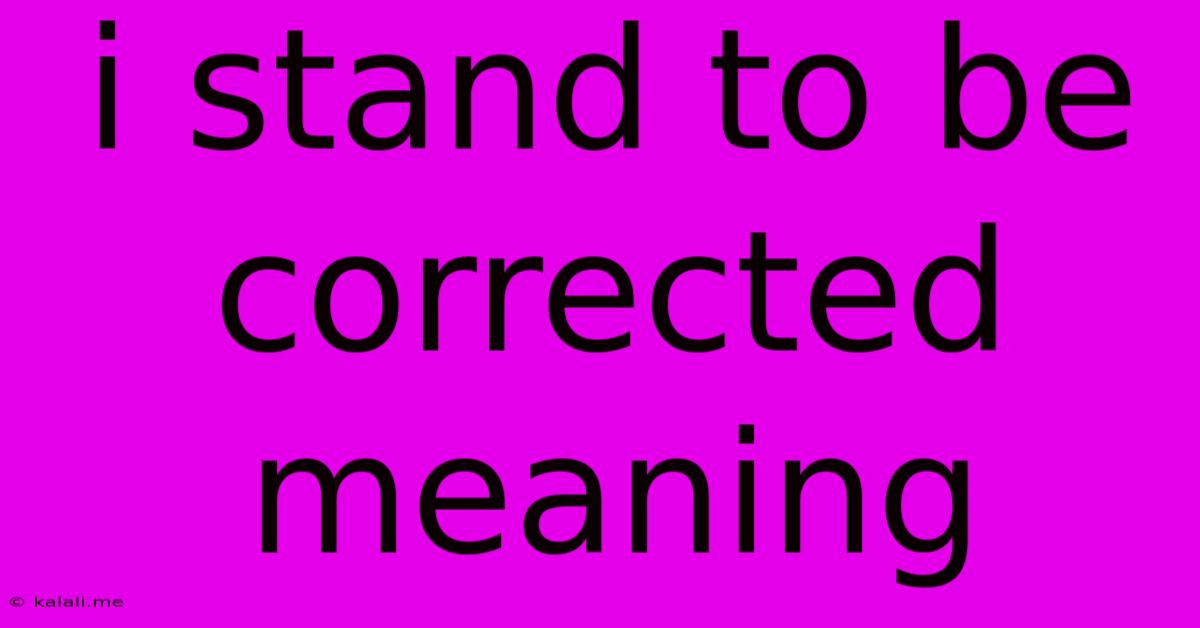I Stand To Be Corrected Meaning
Kalali
Jun 01, 2025 · 3 min read

Table of Contents
I Stand to Be Corrected: Understanding the Meaning and Usage
The phrase "I stand to be corrected" is a common idiom used to express a degree of uncertainty or openness to alternative perspectives. It's a polite and humble way of presenting information, acknowledging the possibility of error or incompleteness in one's knowledge. This article will delve deeper into its meaning, explore various contexts in which it's used, and offer insights into its effective application.
What Does "I Stand to Be Corrected" Mean?
At its core, "I stand to be corrected" signifies a willingness to revise one's statement or belief if proven wrong. It's a disclaimer that softens the assertion, preventing it from sounding overly dogmatic or authoritative. The speaker is essentially inviting correction and demonstrating intellectual humility. It implies:
- Acknowledgement of fallibility: The speaker recognizes that they might not possess complete or perfectly accurate information.
- Openness to new information: They are receptive to alternative viewpoints and are prepared to adjust their understanding based on new evidence.
- Politeness and deference: It's a courteous way of sharing information, particularly when discussing potentially controversial or complex topics.
Contextual Usage: When to Use "I Stand to Be Corrected"
This phrase finds its place in a variety of conversational and written contexts. Consider these examples:
- Sharing factual information: "The capital of Australia is Canberra, I stand to be corrected." This shows confidence in the statement while inviting others to offer corrections if it's inaccurate.
- Expressing an opinion: "I believe the new policy will be beneficial, but I stand to be corrected." This acknowledges that the opinion is subjective and may be challenged.
- Recounting an event: "The accident happened around 3 PM, I stand to be corrected on the exact time." This demonstrates awareness of potential memory lapses.
- Presenting research findings: "Our study suggests a correlation between X and Y, but I stand to be corrected if further research reveals otherwise." This shows scientific rigor and honesty.
Alternatives to "I Stand to Be Corrected"
While "I stand to be corrected" is a powerful phrase, several alternatives convey a similar sentiment:
- "If I'm wrong..." This is a more concise alternative.
- "Correct me if I'm wrong..." This directly invites correction.
- "Please let me know if I've made a mistake..." This is a more formal option.
- "To the best of my knowledge..." This emphasizes the speaker's limited perspective.
- "As far as I understand..." This is suitable when explaining complex matters.
Effective Application: Using the Phrase Naturally
The key to using "I stand to be corrected" effectively is to employ it naturally and not overuse it. Forceful insertion can sound insincere or even self-deprecating. Aim for a balance between confidence and humility. Consider the overall tone of your communication and select the most appropriate phrasing.
In conclusion, "I stand to be corrected" is a versatile and valuable phrase that enhances communication by fostering a collaborative and intellectually honest environment. By understanding its nuances and employing it thoughtfully, you can communicate more effectively and build stronger relationships based on mutual respect and understanding.
Latest Posts
Latest Posts
-
Cement Fence As A Retaining Wall
Jun 03, 2025
-
Is Evaporated Milk The Same As Heavy Cream
Jun 03, 2025
-
How Do I Know If My Fish Is Pregnant
Jun 03, 2025
-
How Long Past Expiration Date Is Sour Cream Good
Jun 03, 2025
-
Do Metaphors Use The Word It
Jun 03, 2025
Related Post
Thank you for visiting our website which covers about I Stand To Be Corrected Meaning . We hope the information provided has been useful to you. Feel free to contact us if you have any questions or need further assistance. See you next time and don't miss to bookmark.